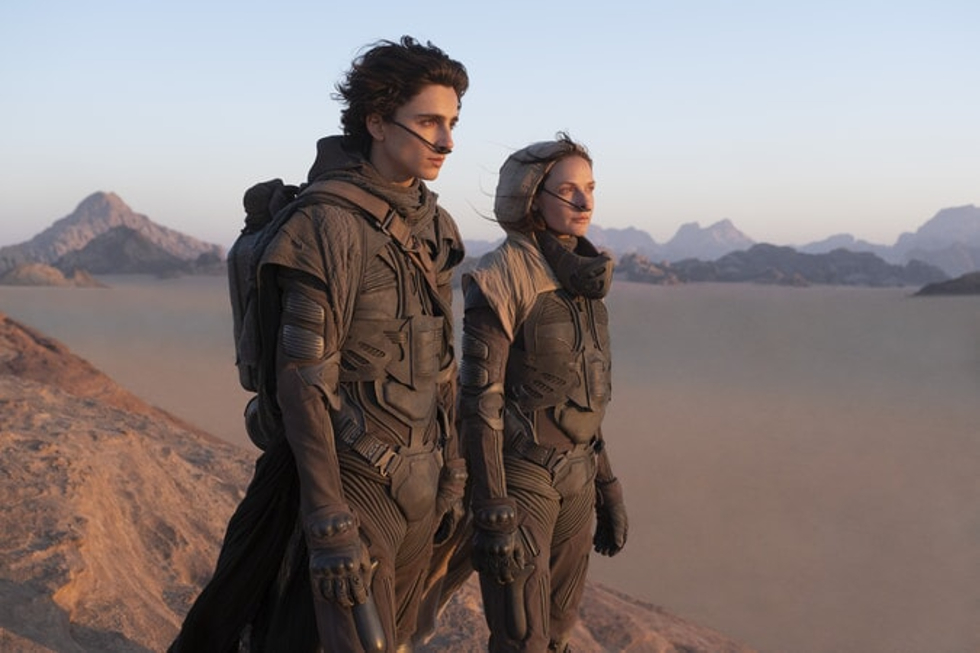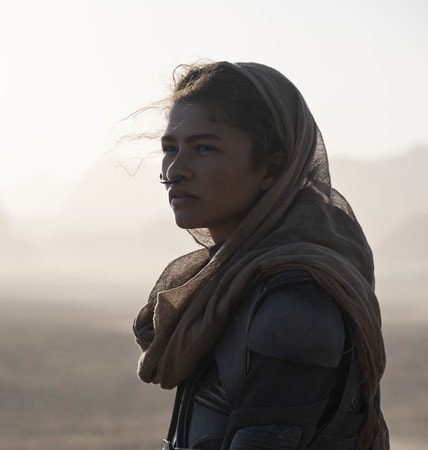Dune: Part One – Reviewed

Denis Villeneuve’s Dune has been much hyped and anticipated. But does it strike the right balance between epic and earnest? Mike Pinnington reviews the unwieldy beast that has slayed more than one big name director in its time…
More than once I’ve thought of Dune as a grown-up Star Wars – or a Star Wars for grownups. It did, after all, come first, in the form of a novel, published in 1965. And, superficially at least, there are many parallels between it and George Lucas’ film’s own mythos. Although its author Frank Herbert neglected to include a droid double-act or roguishly handsome space-pirate cracking wise, his is a world of mysticism, uncertain visions, destiny, and galactic warfare involving clannish factions. There is also a shadowy, Machiavellian puppet master emperor. And, just like Star Wars, it is a story epic in both scale and vision. For his new iteration of Dune, Denis Villeneuve (thankfully) opted against attempting to do justice to so huge a scale in one film, a trick that David Lynch notoriously failed to pull off with his flawed – but not without merit – 1984 adaptation.
But this latest take on the unwieldy beast that is Dune is nonetheless epic (with more than a pinch of earnest); it is brimming with visuals that inspire awe, nailing the oppressive, arid landscapes of the environment that gives it its name. The cast is broadly impressive, bringing to life the frequently dense plot, which revolves around the contested planet Arrakis, whose massive reserves of the sought-after drug, spice, make the dynastic House Atreides’ position as its new custodians nigh on untenable from the off. Oscar Isaac is suitably noble as patriarch, Duke Leto; Jason Momoa has a good go at embodying the faithful Duncan Idaho’s unflinching valour; Sharon Duncan-Brewster as Dr Liet Kynes – a planetologist and go-between with Arrakis’ indigenous population, the Fremen – does a lot with relatively limited screentime.
Speaking of which, Fremen involvement, though not insignificant, is almost blink and you’ll miss it fleeting, and fans of these austere people (including in the form of Zendaya’s Chani) will have to console themselves with the promise of deferred satisfaction in this regard. Villains of the piece, the brutal, sadistic House Harkonnen (who have recently vacated Arrakis at the emperor’s behest), are, though, somehow wanting. Baron Harkonnen, played by a fat-suited Stellan Skarsgård is, ironically, lightweight – offering only brief glimpses of the menace wielded by Lynch’s repulsively memorable counterpart (a gleefully grim Kenneth McMillan). This, disappointing though it is, is perhaps not as critical as you’d think. For it is Timothée Chalamet’s heir to the Atreides legacy, Paul, and Rebecca Ferguson’s Lady Jessica on which the story – and this film’s success or failure – truly rests.

Their fates entwined by blood and prophecy, each is a great foil for the other – Jessica, a member of the secretive order of the Bene Gesserit, leading her son, Paul (in occasionally overwrought fashion) down the path he must tread towards fulfilling his own, and in-turn, much wider-reaching destiny. Their interplay – subtle glances, sign language, practising ‘the voice’ (a kind of pre-Jedi mind-trick) – is compelling; such expressions of mutual filial love and frustration alike lend the film an emotional depth it would otherwise lack. There is a great scene in which Paul and Jessica race to avoid a monstrous sandworm, the planet’s apex predator; the shifting ground rising and gushing like crashing waves against the rocks that are their salvation. Here, the depiction of their almost symbiotic reliance upon one another, sound design and CG combine to thrilling effect.
But, coming in at a stately 2h 35m, things do occasionally lag. A breath-taking set-piece is never far away, however, keeping things moving forwards and the audience more-or-less involved. Such acts of escapist alchemy are by no means simple, and Villeneuve excels in this regard. His earlier forays into the Science Fiction genre – 2016’s Arrival and the following year’s Blade Runner 2049 – have somehow fallen short of marrying the visual and sonic pyrotechnic drama with quieter, human moments, leaving many a viewer (this one included) feeling alienated, and worse, occasionally bored.
Villeneuve’s Dune, though, while it sometimes dangerously skirts similar territory, is a more successful proposition. It is largely satisfying in its plotting, and draws you close enough into the lives and travails of its protagonists so that you can almost feel the unrelenting heat of the Arrakis sun as it beats down on their backs, and the urgency of their mission almost as if it were your own. The desert world of Dune as rendered by Villeneuve is, thankfully, not as dry as it might have been. Striking just about the right balance of ingredients, we await the next chapter with a sense of expectation rather than apprehension. Certainly, I’m looking forward to Dune: Part Two more than I did the last episode of the Star Wars franchise.
Mike Pinnington





